Hot News
As you may have heard, one of our trucks caught fire while it was parked in a parking lot during a driver’s break. Thankfully, no one was injured, but the truck is not able to be repaired. We appreciate your understanding and patience as we head toward the busy holiday season.
-Ridge Meadows Recycling Society
November 12, 2019
In this newsletter…
- Shorter days means shorter hours at the Depot…
- Fall Brush Chipping Program Set-out dates and info…
- Want to help plan Earth Day 2020? Get Active & drop by one of our meetings!
- Our next Repair Cafe is on Saturday, September 21 – and we couldn’t do it without our awesome volunteers!
- Green Drinks! Join your fellow greenies Sept.24 at Big Smoke…
- Check out one of 100 Debates on the Environment on October 1 and learn where your federal candidates stand…
- As always, don’t miss all the amazing events & activities happening in our community!
Subscribe to our monthly newsletters & get all our recycling updates, news, and tips emailed straight to your inbox! You can unsubscribe at any time.
In this newsletter…
- The BC government is looking for feedback on its plan to tackle plastic waste
(go directly to the survey)
- Summer Students Bronte & Robert recap their Plastic Free July experience on a livestreamed video
- Kirk Grayson unveils the benefits and value of Green Infrastructure and Natural Asset Management
- Our next Repair Cafe is part of GETI Fest celebrations on Saturday, September 21.
- As always, don’t miss all the amazing events & activities happening in our community!
Subscribe to our monthly newsletters & get all our recycling updates, news, and tips emailed straight to your inbox! You can unsubscribe at any time.
The BC Government is currently seeking feedback on new policy opportunities and proposed Recycling Regulation amendments to address plastic waste (see July 25, 2019 Media Release). (Go directly to survey…)
The four action areas the BC government is proposing in their Plastics Action Plan: Policy Consultation Paper include:
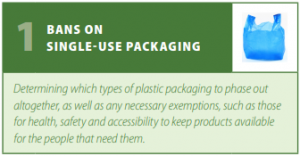
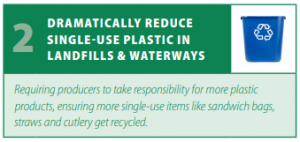
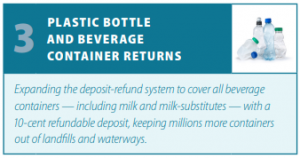
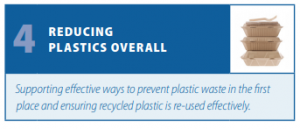
- Bans on Single-Use Packaging:
Determining which types of plastic packaging to phase out altogether, as well as any necessary exemptions, such as those for health, safety and accessibility to keep products available
for the people that need them.
- Dramatically Reduce Single-Use Plastics in Landfills and Waterways:
Requiring producers to take responsibility for more plastic products, ensuring more single-use items like sandwich bags, straws and cutlery get recycled.
- Plastic Bottle and Beverage Container Returns:
Expanding the deposit-refund system to cover all beverage containers – including milk and milk-substitutes – with a 10-cent refundable deposit, keeping millions more containers out of landfills and waterways.
- Reducing Plastics Overall:
Supporting effective ways to prevent plastic waste in the first place and ensuring recycled plastic is re-used effectively
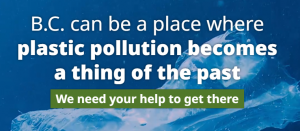 One of the intentions is to create programs that cover many different types of single-use plastic that may not be covered in a future federal plastics ban. It is also a response to the recent BC Supreme Court ruling against the plastic bag ban brought in by the City of Victoria: “The Province is currently reviewing all aspects of the decision and recognizes that local governments need clarity on what their authorities are and the process for acting on those authorities…”
One of the intentions is to create programs that cover many different types of single-use plastic that may not be covered in a future federal plastics ban. It is also a response to the recent BC Supreme Court ruling against the plastic bag ban brought in by the City of Victoria: “The Province is currently reviewing all aspects of the decision and recognizes that local governments need clarity on what their authorities are and the process for acting on those authorities…”
BC also wants to work with the federal government to develop “national recycled content standards to ensure that…any new plastics and packaging produced contain recycled plastic.” This is good news and would provide both a market and a demand for recycled plastic.
In this newsletter…
- What are YOU doing for Plastic Free July?
- Why EMPTYING your containers before recycling them is important
- Our next Repair Cafe is part of the Downtown BIA’s Summer Market on Saturday, July 27.
- ARMS has a number of camps this summer for eco-friendly kids 🙂
- The next “Green Drinks” enviro-get-together is on Wednesday, July 24
- Finally, check out all the amazing events & activities happening in our community – so much going on!!
Subscribe to our monthly newsletters & get all our recycling updates, news, and tips emailed straight to your inbox! You can unsubscribe at any time.
In this newsletter…
- The Government of Canada announces upcoming single-use plastic bans…
- Our next Repair Cafe is part of the City of Maple Ridge’s inaugural Car Free Day event THIS Sunday, June 16.
- SUMMER DEPOT TOUR registration is now open!!
- The next “Green Drinks” enviro-get-together is on Wednesday, June 26
- Congrats to Port Coquitlam on the launch of their first Repair Cafe!
- Finally, check out all the amazing events & activities happening in our community – so much going on!!
Subscribe to our monthly newsletters & get all our recycling updates, news, and tips emailed straight to your inbox! You can unsubscribe at any time.
 Recently we have heard from concerned residents about news stories they are hearing about recycling going through a crisis – here are a couple of examples:
Recently we have heard from concerned residents about news stories they are hearing about recycling going through a crisis – here are a couple of examples:
 “Is Canada’s recycling industry broken?” (Global News, April 29, 2019)
“Is Canada’s recycling industry broken?” (Global News, April 29, 2019)
“Reduce, reuse, recycle, rejected: Why Canada’s recycling industry is in crisis mode” (The Globe & Mail, May 15, 2019).
People had heard that after China closed their doors to overly-contaminated materials, there was nowhere for it to go, and their well-sorted recyclables were going straight into the garbage.
While this may unfortunately be true for other municipalities in North America, it is NOT the case in British Columbia, and definitely not the case in Maple Ridge.
British Columbia is a leader in the recycling industry. Our stewardship programs, regulated and reviewed by the provincial government, are designed to be 100% funded by the manufacturers and retailers of the products themselves. Almost all items we accept at the Maple Ridge Recycling Depotare part of these programs, also known as Extended Producer Responsibilityprograms, or EPR.
 Recycle BC is the not-for-profit organization responsible for residential packaging and paper product recycling throughout British Columbia. They address the China ban and what happens to collected recycling on their website.
Recycle BC is the not-for-profit organization responsible for residential packaging and paper product recycling throughout British Columbia. They address the China ban and what happens to collected recycling on their website.
There are two big reasons why we are largely unaffected by the shifts shutting down recycling programs in other parts of the continent:
1. BC has a local plastic processing plant – Merlin Plastics, located on Annacis Island
2. Recycle BC supports multi-stream recycling, which results in a cleaner product, that is more valuable to processors and easier to market. They also require their collectors to keep contamination levels below 3%.
 Global News (finally) addressed how we are different (and mainly unaffected by recent changes) in a subsequent portions of their coverage – “Canada’s recycling industry is on life support – here’s how to fix it.” and “B.C. better positioned to handle Chinese recycling ban.” CBC News also produced a video addressing “Why B.C. is better at recycling than the rest of Canada.”
Global News (finally) addressed how we are different (and mainly unaffected by recent changes) in a subsequent portions of their coverage – “Canada’s recycling industry is on life support – here’s how to fix it.” and “B.C. better positioned to handle Chinese recycling ban.” CBC News also produced a video addressing “Why B.C. is better at recycling than the rest of Canada.”
While this industrial shift is a major setback to many recycling programs around the world, what will hopefully emerge is a better understanding of how the recycling industry works, the development of local markets and local jobs in the green sector, and more people taking responsibility for the waste they produce.
On Saturday, February 9, Ridge Meadows Recycling Society is launching their second year of Repair Cafés at the Maple Ridge Library from 11am – 2pm with funding provided by Vancity’s enviroFund grant.

Repair Cafés are pop-up events where residents can bring their broken items (small appliances, jewelry, clothing, small toys or furniture, etc.) and there are tools, materials, and volunteer expert “fixers” available to help residents learn to repair their stuff!
 “Last year’s Repair Cafés were a huge success,” says Leanne Koehn, Community Engagement for Ridge Meadows Recycling Society and Coordinator of the Repair Cafés, “We introduced the concept of Repair Cafés to our community, gathered a strong group of talented volunteer ‘fixers,’ and kept many, many items out of the landfill! We are now able to help people from other areas who want to start up their own Repair Cafés!”
“Last year’s Repair Cafés were a huge success,” says Leanne Koehn, Community Engagement for Ridge Meadows Recycling Society and Coordinator of the Repair Cafés, “We introduced the concept of Repair Cafés to our community, gathered a strong group of talented volunteer ‘fixers,’ and kept many, many items out of the landfill! We are now able to help people from other areas who want to start up their own Repair Cafés!”
 In 2018, the group held 8 Repair Cafés in 6 different venues, partnering with the Maple Ridge Library, the Ridge Meadows Seniors’ Society, the Celebrate Earth Day festival, the Haney Farmers Market, and GETI Fest. The Cafés were initiated in large part with funding from the Government of Canada’s New Horizons for Seniors program, donations from Haney Builders, and media sponsorship from the Maple Ridge Pitt Meadows NEWS.
In 2018, the group held 8 Repair Cafés in 6 different venues, partnering with the Maple Ridge Library, the Ridge Meadows Seniors’ Society, the Celebrate Earth Day festival, the Haney Farmers Market, and GETI Fest. The Cafés were initiated in large part with funding from the Government of Canada’s New Horizons for Seniors program, donations from Haney Builders, and media sponsorship from the Maple Ridge Pitt Meadows NEWS.
The goals of Maple Ridge Repair Cafes are to:
- Bring back repair into local society in a modern way
- Maintain repair expertise and share and pass on valuable knowledge and skills that have been learned over lifetimes, building individual and community capacity
- Promote social cohesion in the local community by connecting neighbours
- Repair and reuse items that would’ve ended up in the landfill
- Encourage people to value and appreciate their possessions
 So far, the community has brought 400 items to be fixed by Maple Ridge Repair Café’s 50 volunteers, including 39 lamps, 20 clocks, 17 pairs of pants, 8 bracelets, 5 toasters, 3 stools, and a ceramic chicken!
So far, the community has brought 400 items to be fixed by Maple Ridge Repair Café’s 50 volunteers, including 39 lamps, 20 clocks, 17 pairs of pants, 8 bracelets, 5 toasters, 3 stools, and a ceramic chicken!
Get Involved!
Know someone who has repair skills, wants to learn them, or just wants to help out? Send them to the online form at www.mrrepaircafe.ca or email mrrepaircafe@gmail.com to volunteer as a “Fixer” or a “Helper” and become a Repair Café hero!
 To learn more, visit www.mrrepaircafe.ca or visit the Maple Ridge Repair Café Page on Facebook, email mrrepaircafe@gmail.com or phone Leanne at 604-463-5545.
To learn more, visit www.mrrepaircafe.ca or visit the Maple Ridge Repair Café Page on Facebook, email mrrepaircafe@gmail.com or phone Leanne at 604-463-5545.


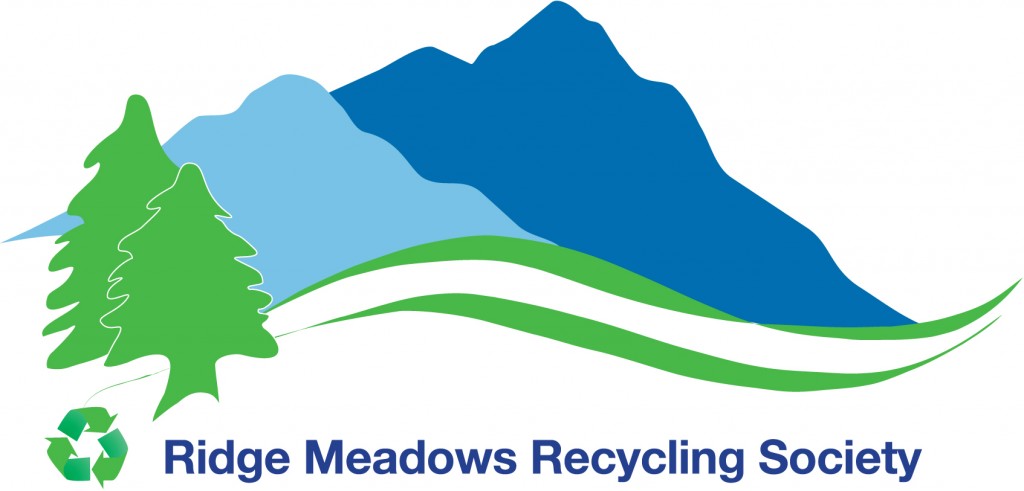
Ridge Meadows Recycling Society’s Position Statement on the Reduction of Single-Use Plastic Items
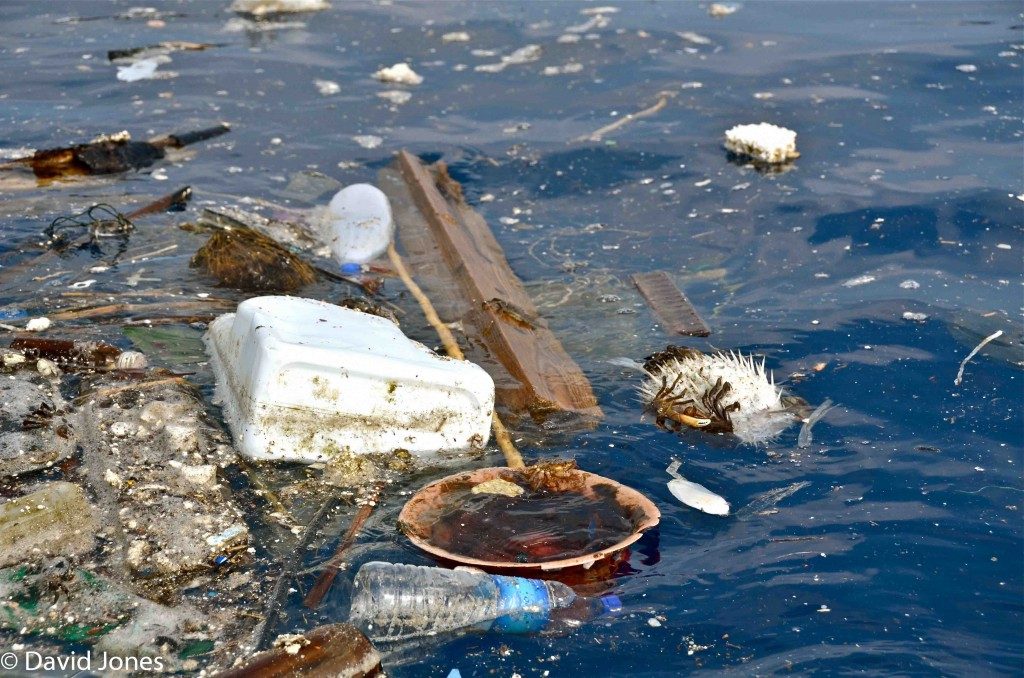 Single use disposable plastic items including take out containers such as cups, plates, bowls, forks, spoons, knives, plastic straws and stirrers, plastic bags and plastic water bottles pose a serious environmental problem around the world.
Single use disposable plastic items including take out containers such as cups, plates, bowls, forks, spoons, knives, plastic straws and stirrers, plastic bags and plastic water bottles pose a serious environmental problem around the world.
These items are used once and are often discarded in our streets and parks. Plastic items do not go away, they simply break down into increasingly smaller pieces.
Plastics fragments can release toxic chemicals into the environment and can be a serious health risk for humans and animals.
It is time for all of us, including both residents and businesses in Maple Ridge, to get serious about reducing the consumption of single use disposable plastic items.
- REDUCE – Choose to avoid single use items. “Just say NO to plastic straws.” Support regional strategies and/or bans on single use items.
- REUSE – Choose to bring your own coffee cup or shopping bag. “Just say NO to plastic grocery bags and disposable cups.”
- RETHINK – Choose the environment and our future over convenience.

Worldwide attention
Lately, there has been a lot of focus on single-use plastic issues in the media. It’s encouraging that people are becoming more aware about this issue and taking action.
Here are some links if you are interested in learning more:
Dialogue on Plastic Waste: online consultation for moving Canada toward zero plastic waste
City of Victoria wins court battle over right to ban plastic bags
Starbucks to Stop Using Disposable Plastic Straws by 2020
Hyatt Announces Global Efforts to Reduce Single Use Plastics
Australia Takes Stand On Single-Use Plastic Bags
Seattle Becomes First Major US City to Ban Plastic Straws & Utensils
Mumbai Bans Plastic Bags & Bottles
By the Numbers: How the World is Banning Single-Use Plastics
If you’re looking for resources, the City of Vancouver has adopted a Single-Use Plastic Reduction Strategy and there is a guide to help Restaurants and Eateries “Reduce Plastic & Benefit Your Business.”
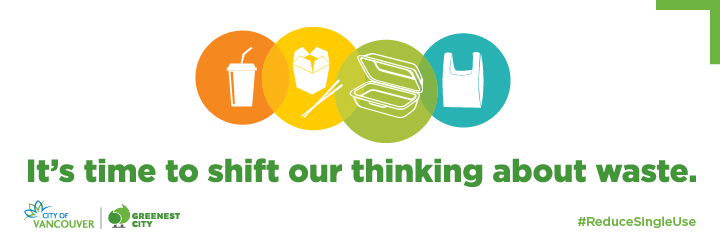
The Problem With Plastic
Did you know every piece of plastic ever created still exists on our planet today? This is because plastic never goes away, it just breaks down into smaller and smaller pieces.
There are a number of issues with having this much plastic in our environment:
1. It never goes away.
2. It absorbs chemicals. This means recycled plastic cannot be made into food-grade containers and absorbed chemicals in non-recycled plastic may be released into the environment or any animal that ingests it.
3.  Animals of all sizes mistake pieces of plastic as food, both on land and in the water.
Animals of all sizes mistake pieces of plastic as food, both on land and in the water.
4. Chemicals absorbed by animals affect their endocrine (hormonal) systems and can be passed to their offspring or passed along the food chain if they are eaten by a larger animal.

Recycling Programs
 At the Maple Ridge Recycling Depot, we are able to accept most plastic packaging through Recycle BC’s recycling stewardship program, including:
At the Maple Ridge Recycling Depot, we are able to accept most plastic packaging through Recycle BC’s recycling stewardship program, including:
–Hard Plastic Packaging
–Soft Plastic Bags & Overwrap
–Other Flexible Plastic Packaging
–Styrofoam (white & coloured)
But look around you – how many other plastic items do you see that don’t fit into the “packaging” category and are not recyclable? What could you use as an alternative? How much plastic do you come in contact with each day?
Plastic Free July
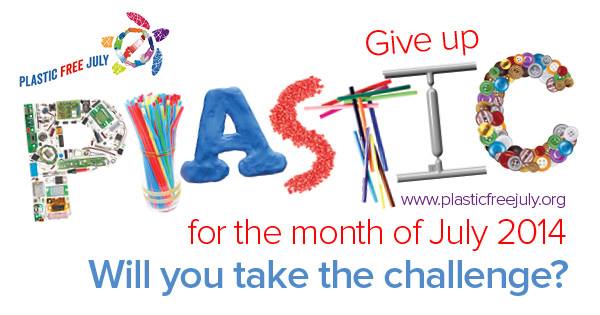 Annually, our summer students take on the Plastic Free July Challenge, where they attempt to go a whole month without using any single-use plastic. Any plastic they are unable to avoid goes into their “dilemma bag” which they unpack and reflect on during a Facebook Livestream session at the end of the month. Check out their Ridge Meadows Plastic Free July Facebook Group!
Annually, our summer students take on the Plastic Free July Challenge, where they attempt to go a whole month without using any single-use plastic. Any plastic they are unable to avoid goes into their “dilemma bag” which they unpack and reflect on during a Facebook Livestream session at the end of the month. Check out their Ridge Meadows Plastic Free July Facebook Group!
Movie Screenings
Ridge Meadows Recycling also has local screening rights to some great movies about this issue:
 The Clean Bin Project:
The Clean Bin Project:
 “Is it possible to live completely waste free? In this multi-award winning, festival favourite, partners Jen and Grant go head to head in a competition to see who can swear off consumerism and produce the least garbage Their light-hearted competition is set against a darker examination of the problem waste. Even as Grant and Jen start to garner interest in their project, they struggle to find meaning in their minuscule influence on the large-scale environmental impacts of our ‘throw-away society’. Described as An Inconvenient Truth meets Super Size Me, The Clean Bin Project features laugh out loud moments, stop motion animations, and unforgettable imagery. Captivating interviews with renowned artist, Chris Jordan and TED Lecturer Captain Charles Moore, make this film a fun and inspiring call to individual action that speaks to crowds of all ages.”
“Is it possible to live completely waste free? In this multi-award winning, festival favourite, partners Jen and Grant go head to head in a competition to see who can swear off consumerism and produce the least garbage Their light-hearted competition is set against a darker examination of the problem waste. Even as Grant and Jen start to garner interest in their project, they struggle to find meaning in their minuscule influence on the large-scale environmental impacts of our ‘throw-away society’. Described as An Inconvenient Truth meets Super Size Me, The Clean Bin Project features laugh out loud moments, stop motion animations, and unforgettable imagery. Captivating interviews with renowned artist, Chris Jordan and TED Lecturer Captain Charles Moore, make this film a fun and inspiring call to individual action that speaks to crowds of all ages.” A Plastic Ocean:
A Plastic Ocean:
“In the center of the Pacific Ocean gyre our researchers found more plastic than plankton. A Plastic Ocean documents the newest science, proving how plastics, once they enter the oceans, break up into small particulates that enter the food chain where they attract toxins like a magnet. These toxins are stored in seafood’s fatty tissues, and eventually consumed by us.” Filmed in multiple locations around the world, “A Plastic Ocean” fearlessly tackles one of the largest and most wide-spread problems in our modern world.
Email leanne@rmrecycling.org if you are interested in setting up screenings for your school, office, or community group. We also recommend “The Lorax” to introduce the topic to younger audiences.
Take Action!
There are also a number of easy ways for YOU to start reducing your use of single-use plastic TODAY. Check out these tips & ideas:



Thank you for choosing the environment over convenience!
In this newsletter, a reminder of the designated Canada Day stat holiday on MONDAY JULY 2 – NO RECYCLING PICKUP, an invitation to join us for a public tour of the Maple Ridge Recycling Depot, our summer students prep for Plastic Free July, and an introduction to a NEW category of items accepted at the Recycling Depot – “Other Flexible Plastic Packaging”…
Click to view a copy of the RMRS June, 2018 Newsletter. This and past newsletters are archived on our website.
Subscribe to our monthly newsletters & get all our recycling updates, news, and tips emailed straight to your inbox! You can unsubscribe at any time.









 One of the intentions is to create programs that cover many different types of single-use plastic that may not be covered in a future federal plastics ban. It is also a response to the recent
One of the intentions is to create programs that cover many different types of single-use plastic that may not be covered in a future federal plastics ban. It is also a response to the recent 


 “Is Canada’s recycling industry broken?”
“Is Canada’s recycling industry broken?”
 Global News (finally) addressed how we are different (and mainly unaffected by recent changes) in a subsequent portions of their coverage –
Global News (finally) addressed how we are different (and mainly unaffected by recent changes) in a subsequent portions of their coverage – 
 “Last year’s Repair Cafés were a huge success,” says Leanne Koehn, Community Engagement for Ridge Meadows Recycling Society and Coordinator of the Repair Cafés, “We introduced the concept of Repair Cafés to our community, gathered a strong group of talented volunteer ‘fixers,’ and kept many, many items out of the landfill! We are now able to help people from other areas who want to start up their own Repair Cafés!”
“Last year’s Repair Cafés were a huge success,” says Leanne Koehn, Community Engagement for Ridge Meadows Recycling Society and Coordinator of the Repair Cafés, “We introduced the concept of Repair Cafés to our community, gathered a strong group of talented volunteer ‘fixers,’ and kept many, many items out of the landfill! We are now able to help people from other areas who want to start up their own Repair Cafés!” In 2018, the group held 8 Repair Cafés in 6 different venues, partnering with the Maple Ridge Library, the Ridge Meadows Seniors’ Society, the Celebrate Earth Day festival, the Haney Farmers Market, and GETI Fest. The Cafés were initiated in large part with funding from the Government of Canada’s New Horizons for Seniors program, donations from Haney Builders, and media sponsorship from the Maple Ridge Pitt Meadows NEWS.
In 2018, the group held 8 Repair Cafés in 6 different venues, partnering with the Maple Ridge Library, the Ridge Meadows Seniors’ Society, the Celebrate Earth Day festival, the Haney Farmers Market, and GETI Fest. The Cafés were initiated in large part with funding from the Government of Canada’s New Horizons for Seniors program, donations from Haney Builders, and media sponsorship from the Maple Ridge Pitt Meadows NEWS. So far, the community has brought 400 items to be fixed by Maple Ridge Repair Café’s 50 volunteers, including 39 lamps, 20 clocks, 17 pairs of pants, 8 bracelets, 5 toasters, 3 stools, and a ceramic chicken!
So far, the community has brought 400 items to be fixed by Maple Ridge Repair Café’s 50 volunteers, including 39 lamps, 20 clocks, 17 pairs of pants, 8 bracelets, 5 toasters, 3 stools, and a ceramic chicken! To learn more, visit
To learn more, visit 

 Single use disposable plastic items including take out containers such as cups, plates, bowls, forks, spoons, knives, plastic straws and stirrers, plastic bags and plastic water bottles pose a serious environmental problem around the world.
Single use disposable plastic items including take out containers such as cups, plates, bowls, forks, spoons, knives, plastic straws and stirrers, plastic bags and plastic water bottles pose a serious environmental problem around the world.











